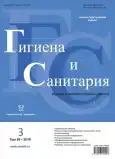DYNAMICS OF THE REGULATORY ADAPTIVE STATUS OF STUDENTS TRAINING WORKING OCCUPATIONS
- Authors: Kiyok O.V.1, Pokrovskiy V.M.1
-
Affiliations:
- Kuban State Medical University
- Issue: Vol 98, No 3 (2019)
- Pages: 314-318
- Section: HYGIENE OF CHILDREN AND ADOLESCENTS
- Published: 14.10.2020
- URL: https://rjsvd.com/0016-9900/article/view/640224
- DOI: https://doi.org/10.47470/0016-9900-2019-98-3-314-318
- ID: 640224
Cite item
Full Text
Abstract
The data presented in the article show the results of the research of educational conditions and adaptive capabilities of students of secondary vocational education training as operators of woodworking machines at the beginning and at the end of the apprenticeship. The value of microclimate indices was revealed to go beyond the allowable level (the indices of temperature were from 25.8C° to 26.3C° while the airspeed was from 0.00 to 0.02 m/sec and the relative humidity reached 34%. The artificial illumination of the working surface on several machines doesn’t match the hygienic requirements (500 lx) and fluctuates from 205 lx to 305 lx. The volume level in the workshop during the work of woodworking machines varies from 79 to 86 db. And wherein, the time regulation and the using of means of collective and individual protection are not implemented right along. In accordance with the Jan Strelau classification genetically determined types of higher nervous activity define organism adaptabilities to the changes of environmental conditions. Students were divided into less adopted (melancholic, choleric, sanguine choleric, melancholic choleric) and more adopted (phlegmatic, sanguine, phlegmatic sanguine, phlegmatic melancholic) groups. Student’s adaptive capabilities were evaluated by indices of cardio-respiratory synchronism test. At the end of the apprenticeship student’s regulatory adaptive capabilities were revealed to decrease. Thereby the regulatory adaptive status index of students training as operators of woodworking machines was decreased by 65.3% in the less adopted group, and by 57.1% in the more adopted group. During the apprenticeship, the complex on unfavorable factors (including professional, caused by the specificity of the chosen occupation) affects the student organism. The index of unfavorable factors influence, depending on vocational training conditions is the integrative estimation of the functional state of the student organism, determining by cardio-respiratory synchronism test parameters.
About the authors
Olga V. Kiyok
Kuban State Medical University
Author for correspondence.
Email: olga.kiek@mail.ru
ORCID iD: 0000-0003-0900-6313
MD, Ph.D., Head of the Department of Profile Hygienic Disciplines and Epidemiology of the Kuban State Medical University, Krasnodar, 395000, Russian Federation.
e-mail: olga.kiek@mail.ru
Russian FederationV. M. Pokrovskiy
Kuban State Medical University
Email: noemail@neicon.ru
ORCID iD: 0000-0002-3971-7848
Russian Federation
References
- Kuchma V.R., Tkachuk, E.A., Taramayeva I.Y. Psychophysiological state of children in the conditions of informatization of their vital activity and intensification of education. Gigiena i sanitariya [Hygiene and sanitation, Russian Journal]. 2016; 95 (12): 1183-7. (in Russian)
- Baranov A.A., Kuchma V.R., Sukhareva L.M., Rapoport I.K. Adolescent health in the formation of their harmonious development. Gigiena i sanitariya [Hygiene and sanitation, Russian Journal]. 2015; 94 (6): 58-62. (in Russian)
- Baranov. A.A., Kuchma V.R., Sukhareva L.M. Medical and social aspects of adaptation of modern adolescents to the conditions of education, training and work.The management for doctors. Moscow: “GOETAR-media”; 2007. (in Russian)
- Kuchma V.R., Sukhareva L.M. Medico-biological and psychosocial problems of adolescence:Monograph.[Mediko-biologicheskie i fiziologicheskie problemy podrostkovogo vozrasta: monografiya]. Moscow: GU NTSZD of the Russian Academy of Medical Science.; 2004. (in Russian)
- Onishchenko G. G. Ensuring the sanitary and epidemiological well-being of the Russian children’s population. Gigiena i sanitariya (Hygiene and sanitation, Russian Journal). 2008; 2:72-77. (in Russian)
- Rapoport I.K., Biryukova of E.G. Morbidity and problems of medical provision of students in vocational schools. Gigiena i sanitariya (Hygiene and sanitation, Russian Journal)..2009; 2: 52-5. (in Russian)
- Shubochkina E. I., Molchanova S. S., Ibragimova E. M., Kulikova A. V. Hygienic and medico-social problems of preparing students in professional colleges. Gigiena i sanitariya (Hygiene and sanitation, Russian Journal). 2009; 2: 26-9. (in Russian)
- Fefelova V.V., Ovcharenko E.S., HolomeevaA.Y., Ignatova I.A., Lunev E.Y. The state of the autonomic nervous system and the metabolism of cells of the immune system in younger schoolchildren under the influence of school information loads. Gigiena i sanitariya (Hygiene and sanitation, Russian Journal). 2016; 95 (2): 177-81. (in Russian)
- Mishchenko N.V., Trifonova T.A., Klimov of I.A. Express assessment of the state of the regulatory systems of the body of students and the identification of a risk group. Zdorov’e naseleniya i sreda obitaniya. 2015; 1 (262): 22-4. (in Russian)
- Setko N.P., Bulychev E.V., BeylinE.B. Hygienic assessment of the functional reserves and adaptive capabilities of students. Gigiena i sanitariya (Hygiene and sanitation, Russian Journal). 2017; 96 (2): 166-70. (in Russian)
- Rakitskiy V.N. Problems of modern hygiene. Gigiena i sanitariya (Hygiene and sanitation, Russian Journal). 2015; 4: 4-7. (in Russian)
- Pokrovskiy V.M. Cardiopulmonary synchronism in the evaluation of the regulatory and adaptive status of the organism. Krasnodar: Kuban Book; 2010. (in Russian)
- Pokrovsky V.M., Ponomarev V.V., Artyushkov V.V., Fomina E.V., Gritsenko S. F., Polishchuk of S.V. A system for determining cardiovascular synchronism in humans. Patent RF N. 86860; 2009. (in Russian)
- Pokrovsky V.M., Polischuk Lily V Cardiorespiratory synchronism in estimation of regulatory and adaptive organism status. Journal of Integrative Neuroscience. 2016; 15 (1): 19-35. https://doi.org/10.1142/S0219635216500060
- Tregubov V.G., Kanorsky S. G., Pokrovsky V.M. Reguljatorno-adaptive status in an estimation of efficiency of pharmacotherapy and the forecast of complications at a chronic heart failure of III functional class. Kardiologiya. 2016; 1: 12-7. https://doi.org/10.18565/cardio.2016.1.12.17 (in Russian)
- Ayzenk G. How to measure the person. From English. Moscow: Kogito-center. 2000. (in Russian).
- StrelyauYa. The role of temperament in mental development. Moscow: Progress. 1982.(in Russian).
Supplementary files









